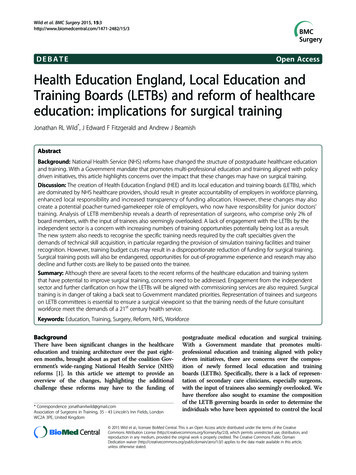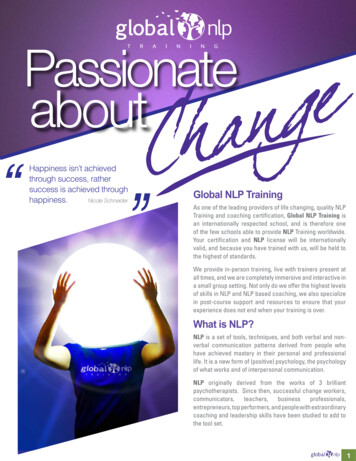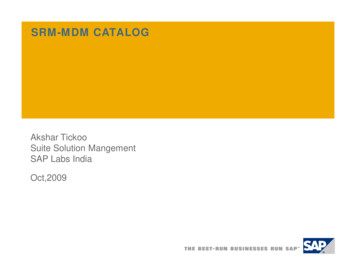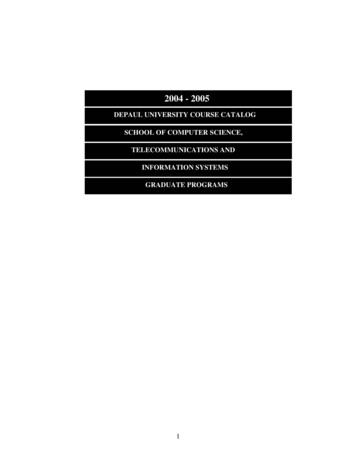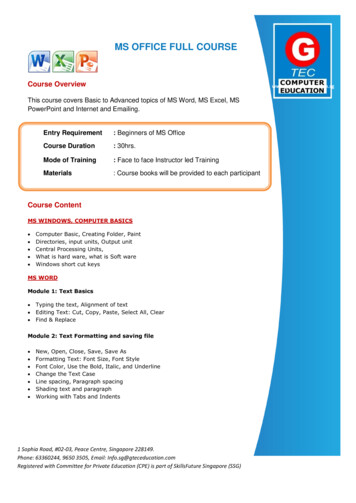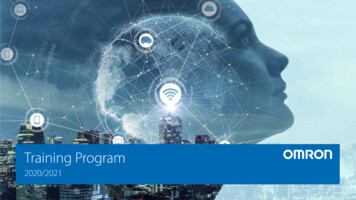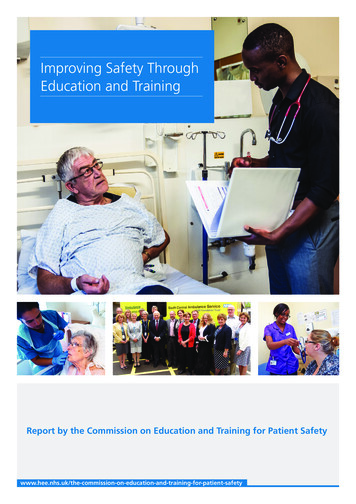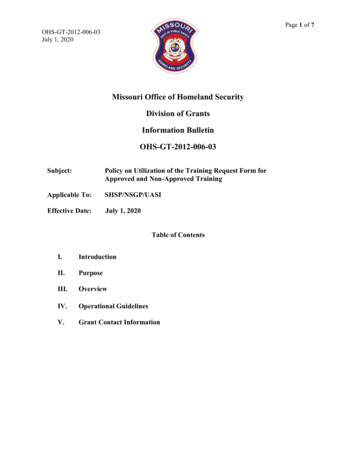
Transcription
Empire State Building350 5th Ave., Suite 301New York, NY 10018Education and TrainingCourse CatalogEmpire State BuildingStamp26350 5th Ave., Suite 314New York, NY 10018Tel: (212) 741-0100Fax: (212) 727-0334www.lifespire.org
It’s Time for Education and Training!For more than 50 years, Lifespire has dedicated its service to improvingthe lives of individuals with intellectual and developmental disabilities.Lifespire is committed to the principle that all individuals with intellectualand developmental disabilities are contributing members of their familiesand communities. It is Lifespire's aim to provide individuals with theassistance and support necessary so that they can attain the skills tomaintain themselves in their community of choice in the most integratedand independent manner possible.Throughout its history, Lifespire has also directed its focus in educating,training and supporting its employees recognizing the importance of havingthe tools to support individuals to live full and rewarding lives. Lifespirerecognizes that all employees are an integral part of the services provideddaily as is committed to providing the necessary education and training tobuild their lives both personally and professionally.This course catalog lists its current classes offered by Lifespire which isconveniently located in the Empire State Building—near all transportation,shopping, restaurants and hotels.For more information or to register for classes,please send an email to: cosborne@lifespire.org2Education and TrainingNotes: Courses can be offered onsite or at Lifespire Consultants are available to develop custom-tailoredcourses for your organizationFor more information regarding courses offered orto register for these courses throughLifespire’s Department of Education and Training,please send an email to: cosborne@lifespire.org25
How May I Help You? A Workshop Designed to SupportReceptionists, Administrative Assts, Office Assts and SwitchboardRelief PersonsThis course will include topics regarding to how: Manage Change in the Workplace Improve Communication (phone skills) Organize Time and Space Handle Difficult Callers and Situations Portray Company Image (personal style, greetings, overallLifespire Values in Action!StewardshipProtecting, honoring, and promoting the people, property andresources with which we have been entrustedExcellenceappearance)Providing superior community services and supportsto people with life challengesIntegrityHonoring our commitment to people we support,each other, and the organization.InnovationLeading and developing new approaches by fosteringopenness to new ways of thinkingHow to Get Out of DebtGrowthThis course offers basic information on how to get out of debt bycreating a personal budget. It is intended to support employees who feeloverwhelmed by their finances and often find themselves having two orthree jobs in order to make ends meet. Students will be given an EXCELcomputer spreadsheet on disc. **Expanding services and supports offered and includenew populations, age groups, and localities.** Students will be able to keep their disc for personal budgetary use.243
Table of ContentsDevelopmental Disabilities and Genetic Syndromes . 6Mental Illness in Persons with Intellectual Disabilities . 6Challenging Behaviors: Diagnosis and Treatment 6Promoting Positive Relationships and Safe Environments forPeople with Developmental Disabilities (OPWDD) . 7First Aid 8Adult/Child CPR 8OSHA (Occupational Safety and Health Administration) 8AMAP (Approved Medication Administration Personnel) . 9Driver SafetySCIP-R (Core & Specialized) . 9SCIP-R (Recertification) 10SCIP-R (Restrictive) . . 10Skills for the New Supervisor . 11Skills for the Seasoned Supervisor . . 11Supervision and Management Responsibilities .11Effective Time Management . .12Resolving Conflicts and Obtaining Results .12Developing Your T.E.A.M. and Leadership Skills 12Documentation of Supervision and Progressive Disciplinary Action 13This course is designed to support employees who already have a validdrivers license. This training has two main components: Written examination – must achieve a grade of 80% or better Driving test – must demonstrate proficient driving skills to theinstructorStudents will have an opportunity to review their driving skills in orderto ensure proper safety measures when driving consumers in agencyvehicles.Note: This is not a points-reduction course.Effective Communication with Your Team .13How to Manage Projects Effectively .14Delegation and Development of a Positive Workplace 14Writing for Valued Outcomes .15Improving Your Professional Writing Skills . .15423
Developing an Orientation Program For Your AgencyTable of ContentsLifespire is available to support your organization in developing an agencyorientation for newly hired employees.Person-Centered Motivational Approaches for Employees .16Topics included but not limited to:Corporate Compliance .17 Full benefits package presentation (i.e. health, tuition, life insurance,etc.) Introduction to intellectual and developmental disabilities Person-centered approaches and first-person language Willowbrook exposé – 30 minute film by Geraldo Rivera Review of agency-specific sexual harassment policy OSHA bloodborne pathogens HIPAA law and expectations OPWDD Part 624 & 633 RegulationsDuring the orientation, course participants will engage in interactiveexercises designed to increase their sensitivity and awareness of issues thatimpact people with disabilities.Coaching Techniques for MentorsThis course is designed to develop direct care employees into mentors.Participants will be able to: Identify and use coaching skills Provide constructive feedback Provide support during the mentoring processPreventing Sexual Harassment in the Workplace . .16Behavioral Interviewing 17Mealtime Safety . 18Cultural Competence and Sensitivity in the Work Environment . .19Who Moved My Cheese: Managing Change .19Computers Trainings: It’s Your Word (beginners, intermediate or advanced) .20 Don’t Be Shook, It’s Outlook (beginners) . .20 Getting Your PowerPoint Across (beginners, intermediateor advanced) .20 Publish with Publisher (beginners, intermediate or advanced). .21 Always Excel (beginners, intermediate or advanced) 21Developing an Orientation Program in Your Agency .22Coaching Techniques for Mentors 22Driver Safety .23How May I Help You? A Workshop Designed to SupportReceptionists, Administrative Assts, Office Asstsand Switchboard Relief Persons .24How to Get Out of Debt . .24The techniques learned in this course are best utilized when the mentorhas the opportunity to coach and support new employees during theirintroductory period of employment.225
Developmental Disabilities and Genetic SyndromesThis seminar covers diagnosis and treatment of developmental disabilities (e.g., ADHD, Autism, and Aspergers), as well as the various geneticsyndromes associated with intellectual disability (e.g., Down Syndrome,Prader-Willi, Fragile X, Fetal Alcohol Syndrome, etc.) Emphasis withgenetic syndromes will be on the emerging material on psychiatric andbehavior phenotypes associated with the syndromes.Mental Illness in Persons with Intellectual DisabilityComputer Training:Publish with Publisher(Beginners, Intermediate or Advanced)Students will create professional brochures, flyers and newsletters forthe workplace.Topics include: Using graphs and templates Choosing the appropriate “tone” for your message Tricks to capture your readers’ attentionThis seminar addresses how mental illness manifests in persons withintellectual disability (mental retardation), and looks at topics such asdiagnosis and treatment – with an emphasis on understanding medicationuse.Highly recommended for Medicaid Service Coordinators,Day Habilitation Leaders, Clinic Therapists, and ABSS StaffChallenging Behaviors: Diagnosis and TreatmentThis seminar will outline how to assess and treat behavioral difficultiesusing the biopsychosocial model. The focus will be on aggression as aparticular illustration of how the approach would apply to all challengingbehavior.Computer Training:(Beginners, Intermediate or Advanced)Always ExcelStudents will create a personal amortization chart using formulas andgraphs. Topics include: Navigating a worksheet Inserting and deleting columns or rows Entering dates and times621
Computer Training:(Beginners, Intermediate or Advanced)It’s Your WordThis hands-on computer training series of Microsoft Word includestopics of: Setting marginsFormatting textSelecting font, size, color and styleCutting and pastingInserting clipartComputer Training:Don’t Be Shook, It’s OutlookPromoting Positive Relationships and Safe Environmentsfor People with Developmental Disabilities (OPWDD)(Beginners)This hands-on computer Microsoft Outlook includes topics on how to: Open and organize their e-mailSave and archive e-mailsApply attachments to e-mailsUse their calendar to set appointmentsCreate distribution listsCreate and organize their address book of contactsThis training designed by OPWDD covers the following topics: Building Positive Relationships Creating a Positive Environment Part 624 overview Reportable Incidents Serious Reportable Incidents Employee ResponsibilitiesComputer Training:Getting Your PowerPoint Across(Beginners, Intermediate or Advanced)This hands-on computer course will teach students to create their ownslide show using slide transitions and animation. This course is mosthelpful for professionals and students who are required to give presentations in the workplace. Students get to ‘show off’ their slide showpresentation at the end of the day. Students will save and keep their workon disc.207
First AidCultural Competence and Sensitivity in the WorkplaceThis half-day course offers participants important life-savingtechniques such as the Black Blow and Abdominal Thrust (formerlyknown as the Heimlich maneuver) and first aid treatment of fractures,wounds, and burns. Staff must receive a score of 80% or better on thewritten exam and demonstrate proficiency in the practical exam in orderto receive certification. The American Red Cross issues First Aidcertification cards.The goal of this course is to expose employees to diverse views ofpeople, their culture and customs in order to understand one anotherwithout judgment. Group and individual exercises provide an opportunity to understand what makes each person unique within their ownworkplace. This course is designed to foster communication amongemployees in the work setting.Adult/Child CPRThis one-day course offers participants important life-saving techniques and safety procedures to follow in the event of an emergency.Cardiopulmonary resuscitation (CPR) is be fully practiced by studentsduring the course. Staff must receive a score of 80% or better on thewritten exam and demonstrate proficiency in the practical exam in orderto receive certification. The American Red Cross issues CPR certificationcards.OSHA (Occupational Safety and Health Administration)Who Moved My Cheese: Managing Change in theWorkplaceThe OSHA standard covering bloodborne pathogens is a regulationdesigned to make the workplace safer. This course will include the following topics:Following the principles outlined in Spencer Johnson’s book “WhoMoved My Cheese,” participants will identify ways to anticipate,monitor, adapt and manage uncertainty that leads to change in theworkplace. Universal precautionsSafe work practices such as hand washingPersonal protective equipment such as latex glovesHepatitis B immunizationConfidentiality of HIV-related information8The course will also identify current trends in our mode ofcommunication in the era of Social Networking (Facebook, Twitter)and the effects it has in the work environment.19
AMAP (Approved Medication Administration Personnel)This four-day course provides participants with the necessary skills togive medication to consumers in a safe manner. Topics discussed includemedication standards, regulations and policies of OPWDD, observationand recording of problems or changes, medication storage and disposal,and administration of medications.Staff must obtain a score of 80% or better on three exams andadminister an errorless pouring with an agency RN in order to be AMAPcertified. A certificate will be awarded upon completion of the course.Employees are expected to be recertified at their own facility once a yearby a Registered Nurse.Mealtime SafetyDesigned by a Speech Language Pathologist, this course will: Increase understanding of normal and abnormal swallowing Increase understanding of risks of choking and aspiration Provide training on safe feeding techniques, including positioning,“danger” foods, and modified food and beverage consistencies Provide training in the use and application of a screening tool—”Lifespire’s Mealtime Risks Questionnaire”SCIP-R (Strategies for Crisis Intervention andPrevention – Revised) 3-day courseThis OPWDD approved course trains staff in the development of skillsnecessary to prevent crisis situations. The course focuses on assistingindividuals in maintaining self-control and trains staff to engage inproactive methods of positive behavioral support. Participants mustdemonstrate competence in the use of personal intervention techniques.A passing grade of 80% or above on both the written as well as thepractical exam is required to achieve certification in SCIP-R. Studentsreceive certificates upon successful completion of the course. OPWDDrequires that each employee attend a one-day recertification course eachyear.189
SCIP-R RecertificationCorporate ComplianceThis one-day course is offered to employees who have already beenSCIP-R certified and are in need of an annual recertification. The courseoffers an overview of the proactive approaches to identifying antecedentsfor individuals with challenging behaviors.This OPWDD regulatory training will cover the following topics:Personal intervention techniques (core and specialized) are reviewed.A passing grade of 80% or above on both the written as well as thepractical exam is required to achieve certification in SCIP-R. Studentsreceive certificates upon successful completion of the course. Instructor’sare State Certified by OPWDD. Prerequisite: SCIP-R course Definition of Corporate Compliance Definitions of Fraud and Abuse Administration of the Corporate Compliance Plan Deficit Reduction Plan 2006 The False Claim Act Policies on Whistleblower Protection and Non-Retaliation PolicyPutting People FirstBehavioral InterviewingThe course is geared towards the hiring management who wants toidentify interviewing techniques that will maximize the likelihood ofmaking a good hire. Key points:SCIP-R RestrictiveThis one-day course in an intensive and advanced course that requiresemployees to use restrictive personal intervention techniques such as aOne or Two Person Take Down. The course includes an overview of theproactive approaches used to prevent a crisis situation.Prerequisite: SCIP-R course10 Centering the job interview based on the requirements of the job notthe contents of the resume Adhering to the principle that past performance is the best predictorof future performance Identifying competencies that are necessary to perform a particularjob function (technical vs. performance)17
Person-Centered Motivational Approaches forEmployeesThis training teaches employees how to create their own personal goalsin order to foster individuality, independence, inclusion and productivityin their own lives. This course is ideal for employees working directlywith people with developmental disabilities. Both group and individualexercises provide employees with an opportunity to understand thatthere are more similarities than differences between people with andwithout a disability.Skills for the New SupervisorThis training is designed for individuals with 3 or less years ofsupervisory experience. Topics include: 6 roles of a supervisor,generation gaps in communication, supervising former co-workers, cultural competence and sensitivity issues, time management, managing multiple priorities and tips on how to delegate work responsibilities.Skills for the Seasoned SupervisorPreventing Sexual Harassment in the WorkplaceSexual Harassment is unwelcome, pervasive behavior of a sexual naturethat can be physical, verbal, or visual. This course will explore two typesof harassment in the workplace:This training is designed for individuals with 3 to 7 years of supervisoryexperience. Participants have the opportunity to share their experiencesas seasoned supervisors, and highlight what ‘works’ and ‘doesn’t work’ inthe work environment. Participants receive coaching to enhance theirsupervisory skills and fulfill their professional objectives. Quid Pro Quo Harassment Hostile EnvironmentParticipants will review examples of sexual harassment and determine aplan of action regarding handling complaints.Supervision and Management ResponsibilitiesThis course is designed for individuals with more than 8 years ofsupervisory experience. It will indentify 6 roles of the seasonedsupervisor as Goal-Setter/Planner, Communication, Leader,Administrator, Trainer/Educator and Competent Technician.Participants will identify the role of a professional and receive importanttips on how to supervisor former co-workers. This experiential class willuse role-playing to “create” different work scenarios.1611
Effective Time ManagementThis course will focus on how to effectively manage time pressures thatinvolve goal-setting, prioritization, action plan setting, procrastinationand scheduling. It will identify how to set SMART goals and include tipson how to manage interruption and stress. Participants are expected tobring their current professional work schedules/calendars to class.Lead, Teach, GrowWriting for Valued OutcomesThrough this training, we will assist you to: Effectively write and identify useful ways to help people discoverand express their valued outcomes Determine which skills should be worked on to help individualsachieve their valued outcomes Create an activity that will reinforce a variety of valued outcomesthrough that one activity. Identify, practice, and put to use characteristics of good documentationResolving Conflicts and Obtaining ResultsThis course is designed for the professional who intends to develop theskill of having empowering conversations with people who are difficult inthe workplace. Students will learn how to develop the skills of listeningand mediation in any situation. Group work and role-playing help bringthe experience to life!Improving Your Writing Skills for the Workplace(beginners or advanced)Developing Your T.E.A.M. and Leadership SkillsThis course will identify common misconceptions of leadership, howleadership effects your everyday life, characteristic of a leader’spersonality, the different roles leaders take on to get the job done, howleaders choose productive members of their team to set the vision,mission and goals of the work environment.12The course is designed for employees who look to improve the skillsnecessary to write professionally. Topics included but not limited to: Writing clear, concise, communicative sentences Using proper punctuation (phrases and clauses) Writing for business—memos, letters, emails and formal reports Using the right word such as: A vs. An, Its vs. It’s, Less vs. Fewer,Lose vs. Loose, Except vs. Accept, Your vs. You’re15
How To Manage Projects Effectively(requires a work assignment)This course will identify 5 project stages necessary to complete and meetdeadlines. It will outline the role of a Project Manager as they considerproject objectives, cost, timelines/schedules and assignments.Participants are expected to bring to class a specific work assignment theyare currently working on in their workplace.Documentation of Supervision andProgressive Disciplinary ActionThis course walks participants through the process of progressivediscipline from verbal to written supervisions. Documentation of progressnotes, performance reviews and communication logs based on performance, productivity and interpersonal issues are reviewed.Effective Communication with Your TeamDelegation and Development of a Positive WorkplaceThis course will identify 10 advantages of delegation and the process ofdeveloping employees to perform at their highest potential based oncompetence, motivation, skill-set, knowledge-base, experience and trackrecord. Participants will explore their own fears and concerns regardingdelegation while learning ways to motivate and empower employees tocreate a positive work environment.14This course will identify the many ways people choose to communicate.Topics included but not limited to: Perception vs. Intention Various Communication Styles in the Workplace 5 Ways People Tend to Listen Verbal and Non-verbal Cues Professional Communication via Email13
Who Moved My Cheese: Managing Change in the Workplace Following the principles outlined in Spencer Johnson’s book “Who Moved My Cheese,” participants will identify ways to anticipate, monitor, adapt and manage uncertainty that leads to change in the workplace. The co

